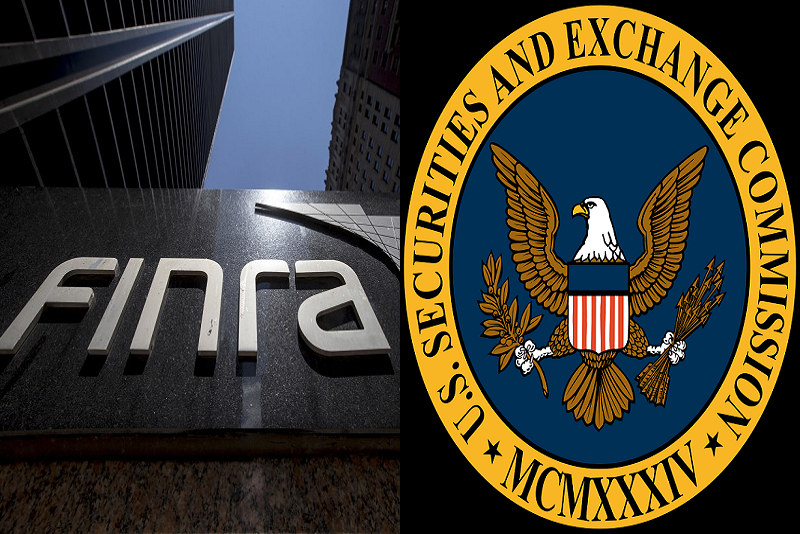BROWSE BY TOPIC
- Bad Brokers
- Compliance Concepts
- Investor Protection
- Investments - Unsuitable
- Investments - Strategies
- Investments - Private
- Features/Scandals
- Companies
- Technology/Internet
- Rules & Regulations
- Crimes
- Investments
- Bad Advisors
- Boiler Rooms
- Hirings/Transitions
- Terminations/Cost Cutting
- Regulators
- Wall Street News
- General News
- Donald Trump & Co.
- Lawsuits/Arbitrations
- Regulatory Sanctions
- Big Banks
- People
TRENDING TAGS
Stories of Interest
- Sarah ten Siethoff is New Associate Director of SEC Investment Management Rulemaking Office
- Catherine Keating Appointed CEO of BNY Mellon Wealth Management
- Credit Suisse to Pay $47Mn to Resolve DOJ Asia Probe
- SEC Chair Clayton Goes 'Hat in Hand' Before Congress on 2019 Budget Request
- SEC's Opening Remarks to the Elder Justice Coordinating Council
- Massachusetts Jury Convicts CA Attorney of Securities Fraud
- Deutsche Bank Says 3 Senior Investment Bankers to Leave Firm
- World’s Biggest Hedge Fund Reportedly ‘Bearish On Financial Assets’
- SEC Fines Constant Contact, Popular Email Marketer, for Overstating Subscriber Numbers
- SocGen Agrees to Pay $1.3 Billion to End Libya, Libor Probes
- Cryptocurrency Exchange Bitfinex Briefly Halts Trading After Cyber Attack
- SEC Names Valerie Szczepanik Senior Advisor for Digital Assets and Innovation
- SEC Modernizes Delivery of Fund Reports, Seeks Public Feedback on Improving Fund Disclosure
- NYSE Says SEC Plan to Limit Exchange Rebates Would Hurt Investors
- Deutsche Bank faces another challenge with Fed stress test
- Former JPMorgan Broker Files racial discrimination suit against company
- $3.3Mn Winning Bid for Lunch with Warren Buffett
- Julie Erhardt is SEC's New Acting Chief Risk Officer
- Chyhe Becker is SEC's New Acting Chief Economist, Acting Director of Economic and Risk Analysis Division
- Getting a Handle on Virtual Currencies - FINRA
ABOUT FINANCIALISH
We seek to provide information, insights and direction that may enable the Financial Community to effectively and efficiently operate in a regulatory risk-free environment by curating content from all over the web.
Stay Informed with the latest fanancialish news.
SUBSCRIBE FOR
NEWSLETTERS & ALERTS
Wrong Way to Change SEC, FINRA Exams Under Trump
by Howard Haykin
“The nature of examinations has typically become more focused in scope," adding that such “deeper dives” pose a greater burden on firms because the regulators probe the issue “at a much more profound level.”
If such an approach to regulatory oversight becomes reality, then all I can say is the SEC and FINRA are making a big mistake.
For regulators to be effective, they need strong relationships with the firms they oversee. And with all relationships, communications is key. Communications come with dialog and interaction. So, how can conducting fewer examinations lead to strong, effective relationships? IT CAN'T! No matter how focused or deeply scoped the exam agenda may be.
FINANCIALISH TAKE AWAY. This writer has always been a proponent of frequent, quick strike audits and exams - and top-down, rather than bottom-up, reviews of companies and their inherent systems. For example:
- Why visit a registered investment advisor, or RIA, once every 3-4 years for a "soup-to-nuts" exam, when field examiners can conduct more frequent exams that focus on just 1 or 2 areas at a time - e.g., broker-dealer relationships, advertising, or trade allocations among separate accounts?
- Why examine a handful of trades out of thousands executed at a broker-dealer, when field examiners can better assess the competency of firm's staff through directeds Q&A or interview sessions?
By visiting B/D's and RIA's more frequently, while changing up the exam agenda and scope, regulators will get more "bang for the buck." The SEC and FINRA will not only improve their relationships with financial institutions, but they will influence brokers and advisors to take a more serious approach to their overall supervisory policies and procedures.
Your thoughts, Messieurs Robert Cook and Jay Clayton?





